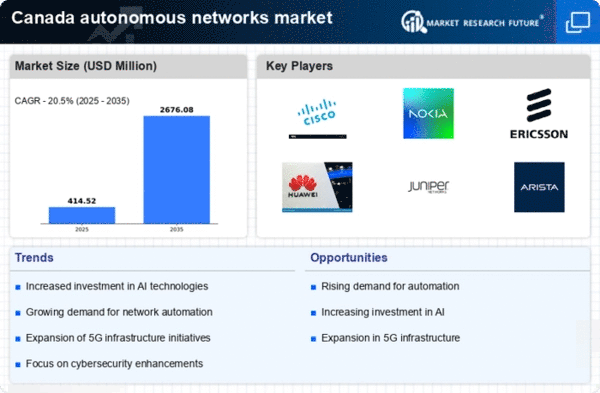Integration of IoT Devices
The proliferation of Internet of Things (IoT) devices is a key driver for the autonomous networks market in Canada. With millions of devices connected to networks, the complexity of managing these connections has increased. Autonomous networks offer the capability to automate network management, ensuring optimal performance and security. In Canada, it is estimated that the number of IoT devices will reach 1 billion by 2026, creating a substantial market opportunity. This integration not only enhances operational efficiency but also supports the development of smart cities and connected infrastructure, further propelling the autonomous networks market.
Growing Cybersecurity Concerns
Cybersecurity remains a pressing issue for organizations across Canada, driving the need for advanced solutions in the autonomous networks market. As cyber threats become more sophisticated, businesses are compelled to adopt proactive measures to safeguard their networks. Autonomous networks offer enhanced security features, including real-time threat detection and automated response capabilities. Recent studies indicate that organizations investing in autonomous security solutions can reduce the risk of data breaches by up to 40%. This growing concern for cybersecurity is likely to propel the adoption of autonomous networks, as companies seek to protect their critical assets.
Investment in 5G Infrastructure
The rollout of 5G technology is significantly impacting the autonomous networks market in Canada. With its promise of ultra-fast data speeds and low latency, 5G is expected to transform various industries, including healthcare, transportation, and manufacturing. The Canadian government has committed substantial funding towards 5G infrastructure development, which is projected to reach $10 billion by 2027. This investment is likely to create a favorable environment for the adoption of autonomous networks, as businesses seek to leverage the capabilities of 5G to enhance their operations and service offerings.
Rising Demand for Network Efficiency
The autonomous networks market in Canada is experiencing a notable surge in demand for enhanced network efficiency. Organizations are increasingly seeking solutions that optimize resource allocation and reduce operational costs. This trend is driven by the need for seamless connectivity and the ability to manage vast amounts of data. According to recent statistics, companies that implement autonomous networking solutions can achieve up to 30% reduction in operational expenses. As businesses strive to improve their service delivery, the autonomous networks market is positioned to benefit significantly from this growing demand for efficiency.
Focus on Sustainable Networking Solutions
Sustainability is becoming a critical consideration in the autonomous networks market in Canada. Organizations are increasingly prioritizing eco-friendly solutions that minimize energy consumption and reduce carbon footprints. The shift towards sustainable networking is driven by both regulatory pressures and consumer demand for greener technologies. It is estimated that implementing autonomous networking solutions can lead to a 20% decrease in energy usage. As companies align their strategies with sustainability goals, the autonomous networks market is likely to see a rise in demand for solutions that support these initiatives.
















